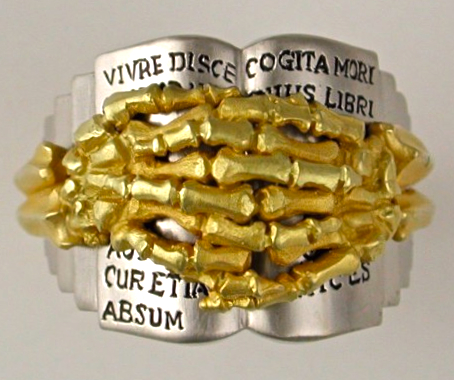

Title: The Book Ring Made Of Platinum & Gold By Designer Kim Eric Lilot
Shipping: $29.00
Artist: N/A
Period: Contemporary
History: N/A
Origin: N/A
Condition: Museum Quality
Item Date: 2009
Item ID: 1677
A unique Gentleman's 'Memento Mori' ring in 18 karat yellow gold and Palladium (Platinum family). The skeletal arms and hands encircle an open book which has upon the open pages engraved and inlaid with black enameling the following quotations: Viver disce, cognita mori. (Learn to live, remember Death.) Tu fui, ego eris. (What you are, I was. What I am, you will be.) Cur etiam hic es. (Why are you still here?) Aut disce aut discede. (Either learn or leave.) Cave ab homine unius libre. (Beware of anyone who has just one book.) Absum! (I'm outta here!) These epigrams and transcriptions were found while researching Italian mortuary art. Limited edition: 03/05 The ring is a size 9 (American Standard) nad can be resized to your specifications without altering the design. The yellow gold skeleton portion is rivited to the Palladium base. *All of the art is edited and chosen by us for its high quality and workmanship before posting. These collectibles have been selected with the artist & collector in mind. We are committed to enhancing our customer’s lives by discovering creating, and pointing out only the best art we can find in the world today. We Are Taste-Makers, Art Advisers, Consultants & Publishers Of Spectacular Art Stories. Our job is to be intermediaries between buyers and sellers. We are vetting for high end art patrons. We are determined to catalog the world's most exceptional art and share it with everyone.
Link: http://en.wikipedia.org/wiki/Memento_mori
Memento mori is a Latin phrase meaning "Be mindful of death" and may be translated as "Remember that you are mortal," "Remember you will die," "Remember that you must die," or "Remember your death". It names a genre of artistic creations that vary widely from one another, but which all share the same purpose, which is to remind people of their own mortality.
In ancient Rome, the phrase is said to have been used on the occasions when a Roman general was parading through the streets of Rome during the victory celebration known as a triumph. Standing behind the victorious general was a slave, and he had the task of reminding the general that, though he was up on the peak today, tomorrow was another day. The servant did this by telling the general that he should remember that he was mortal: "Memento mori." It is also possible that the servant said, rather, "Respice post te! Hominem te esse memento!": "Look behind you! Remember that you are but a man!", as noted in Tertullian in his Apologeticus.[1] Another phrase used in such a setting is Sic transit gloria mundi.
The concept, in the art of classical antiquity, was more frequently embodied in the phrase carpe diem, or "seize the day," a phrase most well-known from Horace's ode to Leuconoe.